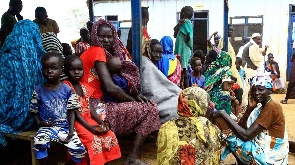 People gather at camp for South Sudanese refugees in Sudan's White Nile state in September 2021
People gather at camp for South Sudanese refugees in Sudan's White Nile state in September 2021
Violent conflict among armed factions in South Sudan’s Upper Nile and Greater Fangak is hindering humanitarian aid to thousands of people already devastated by flooding. Médecins Sans Frontières (MSF), or Doctors Without Borders, a medical charity group, says besides deaths and serious injuries of hundreds of people, the displaced are facing serious food shortages after relief supplies delivery was blocked by sporadic fighting “Catastrophic flooding and impeded access for humanitarian organisations to deliver essential and life-saving aid has made the situation even direr. “We are calling on all armed groups involved in the fighting to immediately cease targeting civilians and to guarantee humanitarian access for organisations to deliver aid to civilians in urgent need of assistance,” said MSF. Heavy conflict The initial fighting began in Panyikang and Fangak Counties in July but escalated into heavy conflict by mid-August. The fighters have also targeted the displaced people. Last month, armed groups attacked a makeshift displacement camp in Adidhiang where mostly women and young children had sought refuge, a UN situational report showed. Numerous people were killed in the attack and many more drowned in the floodwaters as they tried to escape, said MSF. The recent clashes in Diel and Fashoda County of Upper Nile have resulted in thousands more freshly displaced people, with MSF stressing that some who fled said that they spent up to a week walking through swamps. “The Protection of Civilians (PoC) site in Malakal is being inundated with new arrivals, with more than 18,000 people seeking safety in the camp. Prior to this, the PoC already hosted around 34,000, and the sudden surge of people is pushing services to the brink,” said MSF. “During the rainy season, this often requires transporting patients along the White Nile River – as flooding prevents planes from being able to land in Old Fangak – but insecurity along the Nile is now making this impossible,” the charity group stressed. MSF Head of Mission in South Sudan Aline Serin revealed that the last movement the organisation made on the White Nile River was in late August.
Violent conflict among armed factions in South Sudan’s Upper Nile and Greater Fangak is hindering humanitarian aid to thousands of people already devastated by flooding. Médecins Sans Frontières (MSF), or Doctors Without Borders, a medical charity group, says besides deaths and serious injuries of hundreds of people, the displaced are facing serious food shortages after relief supplies delivery was blocked by sporadic fighting “Catastrophic flooding and impeded access for humanitarian organisations to deliver essential and life-saving aid has made the situation even direr. “We are calling on all armed groups involved in the fighting to immediately cease targeting civilians and to guarantee humanitarian access for organisations to deliver aid to civilians in urgent need of assistance,” said MSF. Heavy conflict The initial fighting began in Panyikang and Fangak Counties in July but escalated into heavy conflict by mid-August. The fighters have also targeted the displaced people. Last month, armed groups attacked a makeshift displacement camp in Adidhiang where mostly women and young children had sought refuge, a UN situational report showed. Numerous people were killed in the attack and many more drowned in the floodwaters as they tried to escape, said MSF. The recent clashes in Diel and Fashoda County of Upper Nile have resulted in thousands more freshly displaced people, with MSF stressing that some who fled said that they spent up to a week walking through swamps. “The Protection of Civilians (PoC) site in Malakal is being inundated with new arrivals, with more than 18,000 people seeking safety in the camp. Prior to this, the PoC already hosted around 34,000, and the sudden surge of people is pushing services to the brink,” said MSF. “During the rainy season, this often requires transporting patients along the White Nile River – as flooding prevents planes from being able to land in Old Fangak – but insecurity along the Nile is now making this impossible,” the charity group stressed. MSF Head of Mission in South Sudan Aline Serin revealed that the last movement the organisation made on the White Nile River was in late August.